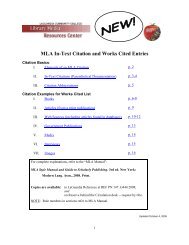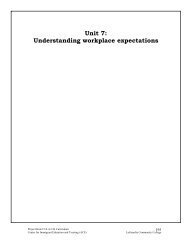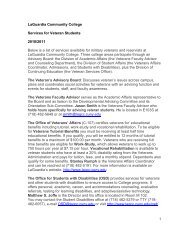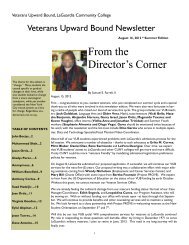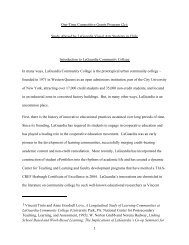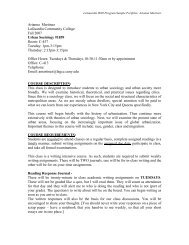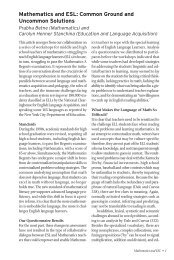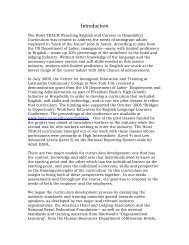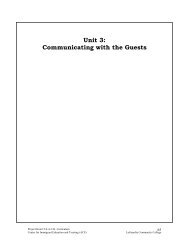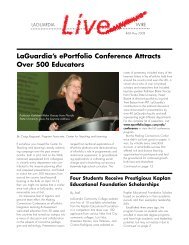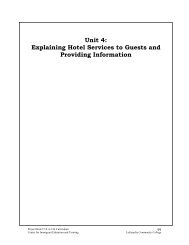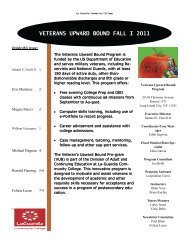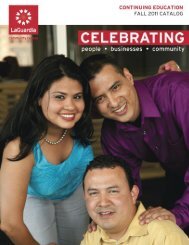COURSE INDEX - LaGuardia Community College
COURSE INDEX - LaGuardia Community College
COURSE INDEX - LaGuardia Community College
Create successful ePaper yourself
Turn your PDF publications into a flip-book with our unique Google optimized e-Paper software.
Mathematics, Engineering, and Computer Science Department<br />
also be considered. Vector algebra will be used where appropriate.<br />
Prerequisite: SCP231, MAT203<br />
MAE213 Electrical Circuits I<br />
3 credits; 3 hours<br />
Students are introduced to the analysis of basic AC and DC circuits<br />
containing resistors, inductors, capacitors, and both independent<br />
and dependent sources of voltage and current. Voltage<br />
division and current division yield simplified analysis of resistors<br />
(impedences) in series and in parallel, respectively. Thevenin’s and<br />
Norton’s theorems are used to determine equivalent subcircuits.<br />
Differential equation techniques are presented to simplify the<br />
analysis of AC circuits.<br />
Prerequisite: SCP231, MAT203<br />
MAE219 Thermodynamics I<br />
3 credits; 3 hours<br />
This course introduces students to basic physical concepts and<br />
applications of thermodynamics, and to their consequences for<br />
engineering processes and operations. Emphasis is placed on the<br />
first and second laws. Properties of pure substances are studied,<br />
along with basic principles governing transformations of energy,<br />
particularly heat, and work. Behavior of mixtures of gases and<br />
vapors and air conditioning are considered. An elementary introduction<br />
to cycles (Carnot cycle, reversibility, power and refrigeration<br />
cycles) completes the course.<br />
Prerequisite: SCP232, SCC201, MAT203, MAT204<br />
Mathematics Courses<br />
MAT095 Introduction to Algebra<br />
0 credit; 6 hours (5 lecture, 1 lab)<br />
(Equivalent to First Year Institute USM095)<br />
The course has a problem solving approach that emphasizes the<br />
importance of mathematical reasoning in addressing real-world<br />
problems drawn from diverse disciplines. Topics include arithmetic<br />
(signed numbers, fractions, decimals and percents), elementary<br />
algebra (solving first degree equations, finding equations of<br />
lines, using rules of exponents), basics of geometry (area and<br />
perimeter) as well as numeracy (estimation, unit analysis). The<br />
course is intended for students with little or no algebra background.<br />
Admission to the course is based on placement test scores.<br />
MAT096 Elementary Algebra<br />
0 credit; 6 hours (5 lecture, 1 lab)<br />
(Equivalent to First Year Institute USM096 or USM097)<br />
This course provides a careful treatment of elementary algebra,<br />
beginning with linear equations, ending with quadratic equations<br />
and emphasizing the interplay between graphic and algebraic rep-<br />
resentations. Topics include straight line graphs, systems of linear<br />
equations, introduction to functions, rules of exponents, polynomial<br />
algebra, factoring, radical expressions and the quadratic<br />
formula.<br />
Admission to the course is based on placement test scores.<br />
MAT103 Early Concepts of Math for Children<br />
3 credits; 3 hours<br />
This course combines theory with practical aspects of how children<br />
learn mathematics. Students learn how to help young children<br />
to develop numerical relationships and geometric patterns.<br />
This course is of particular value to Child Development majors,<br />
prospective elementary school teachers and parents.<br />
Prerequisite: CSE099, MAT096<br />
MAT104 Mathematics in Elementary Education<br />
3 credits; 3 hours<br />
This is the second course of a sequence devoted to the study of how<br />
children learn mathematics. The course examines the mathematics<br />
curriculum of the elementary school with an emphasis on how to<br />
teach it. Among the topics included are operations on rationals,<br />
geometry, measurement, and basic notions of statistics of particular<br />
value to prospective school teachers and paraprofessionals.<br />
Prerequisite: MAT103<br />
MAT106 Mathematics of Medical Dosages<br />
2 credits; 2 hours<br />
This course is designed for Nursing majors and will aid them in<br />
applying basic mathematical concepts to on-the-job situations.<br />
Students will learn the various techniques of calculations. These<br />
include conversions using metric, household and apothecary<br />
systems of measurement as well as the computational methods<br />
used in the preparation of oral medication, solutions, parenteral<br />
therapy and pediatric dosages.<br />
Prerequisite: MAT096; Corequisite: SCR110<br />
MAT107 Mathematics and the Modern World<br />
3 credits; 3 hours<br />
This course introduces selected topics in mathematics which have<br />
significant application in other fields. For each topic studied,<br />
emphasis will be placed first on the mathematics itself, and then<br />
on one or more significant applications of the mathematics. Topics<br />
to be included will be chosen from the areas of number theory,<br />
algebra, probability and statistics, topology, computers and<br />
geometry.<br />
Prerequisite: CSE099, ENA/ENG/ESA099/ENC101, MAT096<br />
MAT115 <strong>College</strong> Algebra and Trigonometry<br />
3 credits; 4 hours (3 lecture, 1 lab)<br />
This course will start with a review of basic algebra (factoring,<br />
solving linear equations, and equalities, etc.) and proceed to a<br />
study of polynomial, exponential, logarithmic and trigonometric<br />
functions. These functions will be used in applications involving<br />
simple mathematical modeling where students will engage in<br />
inquiry activities aimed at improving critical thinking skills.<br />
Prerequisite: MAT096, COMPASS scores of 35 or higher on<br />
161



